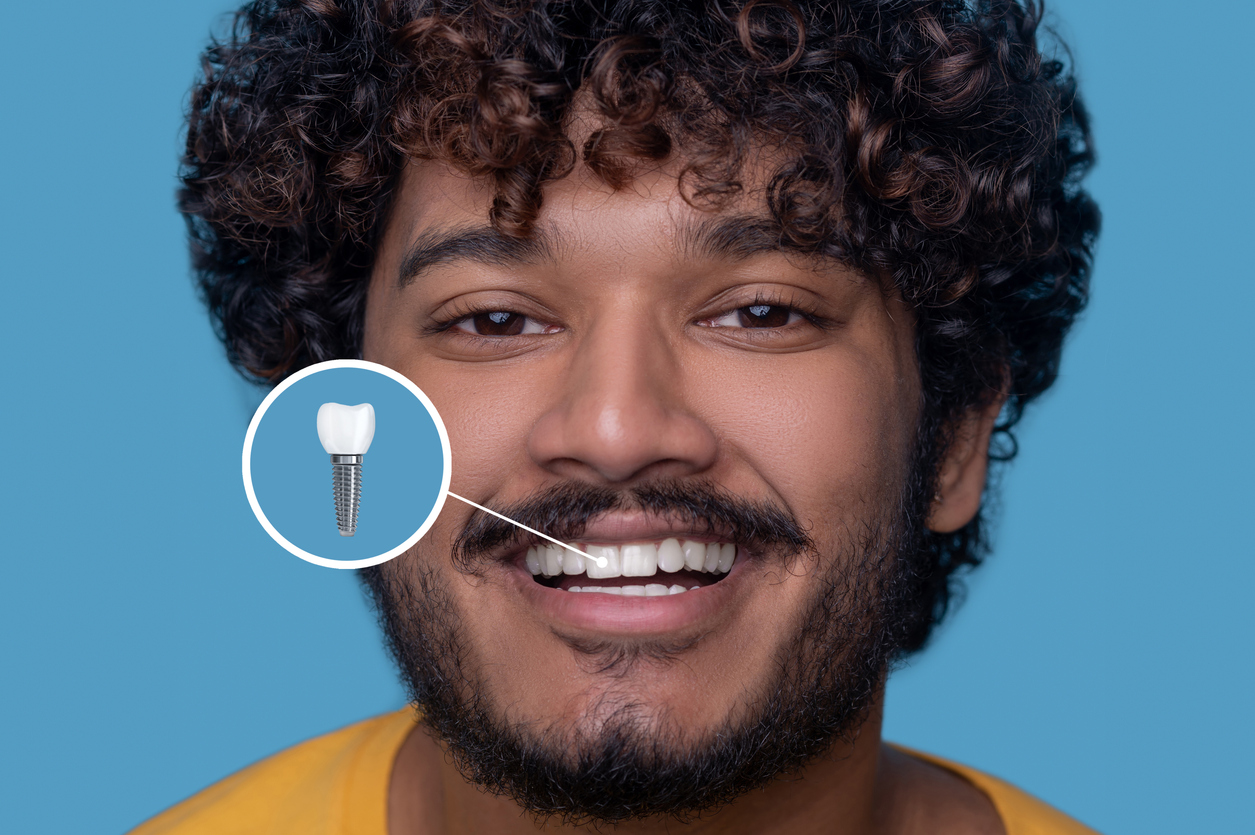Getting dental implants can be a costly and time-consuming procedure, so it’s no wonder you want them to last as long as possible. In this article, we discuss how to care for dental implants to maintain their quality and appearance and your oral health.
How To Care for Dental Implants
Proper care for dental implants consists of an excellent at-home oral hygiene routine, some dietary restrictions, and regular dental visits. However, there are some essential points to remember when caring for your implants.
Oral Hygiene Routine with Dental Implants
For the most part, the oral hygiene routine with dental implants is similar to that with your natural teeth. It consists of brushing your teeth twice a day and flossing daily. Proper and thorough hygiene is paramount with dental implants because even though implants themselves can not get cavities, bacteria, and plaque buildup can lead to gum disease. Gum disease is dangerous because it makes your gums infected and can penetrate and destroy the jawbone. Once it happens, your gums and jawbone will no longer be able to properly support your implants, causing the dental restoration to fail.
Dental Implants Brushing Tips
- Brush your teeth thoroughly twice a day, using a soft-bristled toothbrush and a non-abrasive toothpaste. Using harder toothbrushes and toothpaste with baking soda or charcoal can create micro scratches on the surface of your implants, leading to staining and discoloration.
- Do not use whitening toothpaste or over-the-counter whitening solutions on your dental implants. These solutions are meant for the enamel of natural teeth, which is much more porous than the material of implants. If you want to remove the stains or discoloration from your implants, seek professional cleaning procedures.
Dental Implants Flossing Tips
- Be careful when flossing with dental implants. The difference between implants and natural teeth is that they are not fused with the gums but rely on the peri-implant seal instead. If you floss too forcefully, it can damage the seal. Once the seal is compromised, bacteria and food particles can collect in the pockets, leading to infections.
- Choose floss that does not easily break or shred. A broken piece of floss can get stuck in your mouth, leading to irritation or infection.
- Make sure you thread the loss correctly to clean the space between the gums and dental implants under the edges of the gum lines. Try using a floss threader to streamline the process.
- Consider using a water flosser. Some spots areas in the mouth can be hard to reach with a traditional floss and brush. A water flosser can effectively clean those areas. It is also effective at removing plaque along the gum line. However, a water flosser can not replace brushing your teeth or using a traditional floss. Use it as an additional step to further enhance your oral hygiene routine.
Visit Your Dentist Regularly
Visit your dentist every 6 to 12 months for checkups and professional cleanings to avoid developing gum disease and staining accumulation on the surface of your implants. Even if your at-home hygiene routine is impeccable, some plaque will still linger on the teeth and gums, eventually hardening and turning into tartar, which is impossible to remove at home.
Foods to Avoid With Dental Implants
When your mouth is fully healed after the procedure of getting dental implants, you will be able to eat most foods, just as you used to with your natural teeth. In fact, dental implants provide about 90% of your natural bite force. However, there are still certain foods and beverages you need to abstain from to avoid staining or damaging your dental implants.
- Foods and drinks containing a dye that can stain implants, such as sodas, brightly colored candies, etc.
- Natural foods that can stain your teeth: fruit juices, berries, coffee, black tea, red wine, curry, beetroot, brightly colored spices, etc.
- Crunchy and hard foods that require biting down with force because they can crack or scratch the implants. Such foods might include hard apples, crackers, nuts, popcorn, ice cubes, etc.
- Sticky foods, such as caramel, taffy, and other types of sticky candies.
If you consume staining foods or beverages, rinse your mouth or brush your teeth immediately after the meal. Do not use your teeth as tools, as this can also easily damage your implants.
Make an Appointment Today
If you want to get dental implants, have a consultation, or have an implant maintenance visit, do not hesitate to make an appointment with a dentist in Beverly Hills today. The specialists at GLO Modern Dental provide modern, high-quality implant services and are looking forward to welcoming you to our dental office.
